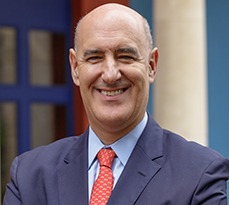
Eight leading business schools including Cambridge Judge Business School have joined together to acknowledge the climate crisis and collaborate to support business leaders who will act to address the climate emergency. The initiative begins with a climate leadership toolkit, to be released at the COP26 climate-change conference in Glasgow on Wednesday 10 November, which includes a chapter on “Climate change and nature: what business needs to know” authored by Jennifer Howard-Grenville, Diageo Professor in Organisation Studies at Cambridge Judge.
Business Schools for Climate Leadership (BS4CL.org) is a unique alliance of business academic thought leaders, made up of founding members Oxford Saïd Business School, Cambridge Judge Business School, HEC Paris, IE Business School, IESE Business School, INSEAD, International Institute for Management Development and London Business School. Collectively, these schools train more than 55,000 students and executives per year, and are stewards of alumni bodies in excess of 400,000 people.
“I don’t think business schools have done nearly enough to address the challenge of climate change,” says Professor Mauro Guillén, the Dean of Cambridge Judge Business School. The reason is very simple: no organisation, no government, no company has done enough. We need to focus our minds on this monumental threat to humanity. I look forward to collaborating with our peer schools in this effort.”
A new page on Cambridge Judge’s website – Cambridge Judge on developing a sustainable future – includes insight from the Business School’s faculty and other experts on various issues relating to climate change and sustainability, including climate finance, electric vehicle uptake and green entrepreneurial thinking.

As agents of change and the catalysts for thought leadership in today and tomorrow’s business leaders, the founding members of BS4CL recognise their role in driving and accelerating business activities towards the goals of the Paris Agreement and the UN Framework Convention on Climate Change.
Their goal is to support climate leaders and organisations by collaborating on research to identify and shape best practices, and by working across sectors and generations to accelerate the business community’s response to climate change. Collectively they will raise awareness of the urgency for climate change mitigation and adaptation, seeking to have an impact through joint outreach to all eight alumni communities.
As a first step, academics from the eight founding schools worked together to produce a BS4CL climate leadership toolkit, which will be released at COP26 in Glasgow on 10 November. In the run-up to this release, the group is holding a series of webinars to share this content, where each session has participants from multiple schools. The webinars, and ultimately the toolkit, are accessible for free at BS4CL.org. This initial collaboration focuses on eight topics:
- Climate Change and Inequality (INSEAD)
- Decarbonising Business (HEC Paris)
- Global Strategy in a World Transformed: Business Strategy and Geopolitics (IESE Business School)
- Technology and Innovation as a Climate Change Solution (IE Business School)
- Business Transformation and Climate Change (The International Institute for Management Development)
- Risk Management and the Green Energy Transition (Oxford Saïd)
- Climate Change and Nature: What Business Needs to Know (Cambridge Judge)
- Climate Standards and Enterprise Value (London Business School)
The toolkit will be launched on 10 November at the Sustainable Innovation Forum hosted by Climate Action on the Scottish Event Campus (SEC) at the UN Climate Change Conference COP26 in Glasgow, in partnership with InTent.
In a joint statement, the deans of the eight business schools said:
“The crises presented by the global pandemic have highlighted the important role academic institutions must play in providing leadership in times of emergency. Now, as we face one of the greatest challenges of our time – global warming, there has never been a more critical moment for collaboration between our institutions.
“We recognise the need to initiate the search for answers, which will galvanise and promote meaningful action. BS4CL builds on the integrated climate leadership expressed across our individual curricula and faculty research, providing the means to co-operate on a long-term basis. We mean to build the foundations with which businesses can lead global action to collaborate across sectors to limit climate change and to promote meaningful and visible progress. Our Post-COP26 Agenda will bring together our collective faculties to share and develop new insights on the rapidly evolving and urgent agenda.”
The toolkit chapter by Professor Jennifer Howard-Grenville outlines how climate change and the destruction of nature are inextricably linked, so the long-term sustainability of business and the economy requires climate actions that also restore and maintain nature. Continued negative impact of business activity on nature will make it more difficult to implement nature-based solutions to climate change such as reforestation and nature-focused shifts in food, land and water use.
“By sequestering and storing carbon, nature mitigates climate change – for free,” Jennifer writes. “The carbon equivalent of a decade’s worth of human emissions is held within the Amazon rainforest, yet nearly 20% of its area has been destroyed by economic activity. This not only reduces the Amazon’s capacity to sequester carbon emissions, but also alters rainfall patterns, habitats, and biodiversity, making the rainforest less resilient to wildfire and other climate-induced changes.”
The contribution by Jennifer details practical ways for business leaders to address this urgent issue, through measures such as: the careful tracking of how reporting frameworks for nature integrate into climate action; ensuring that companies have accurate insight for their carbon offsetting strategies; new ways of thinking that incorporate inputs from diverse stakeholders; and prioritising nature-positive actions to address the most valuable biodiverse areas.
“The connections between climate change and nature – and the value to business and society from all that nature provides – clean water, clean air, food, fibre, pollination, healthy living environments, and natural defences against flood, forest fire and drought – are increasingly recognised by business, investors, and policy makers,” Jen says. “The UN Convention on Biological Diversity will soon adopt a Post-2020 Global Biodiversity Framework that sets targets, as the Paris Agreement does on climate change, for nations to protect and restore nature. Businesses will need to understand and increasingly disclose their impacts on nature, and align their reporting and actions with a nature-positive agenda.”


